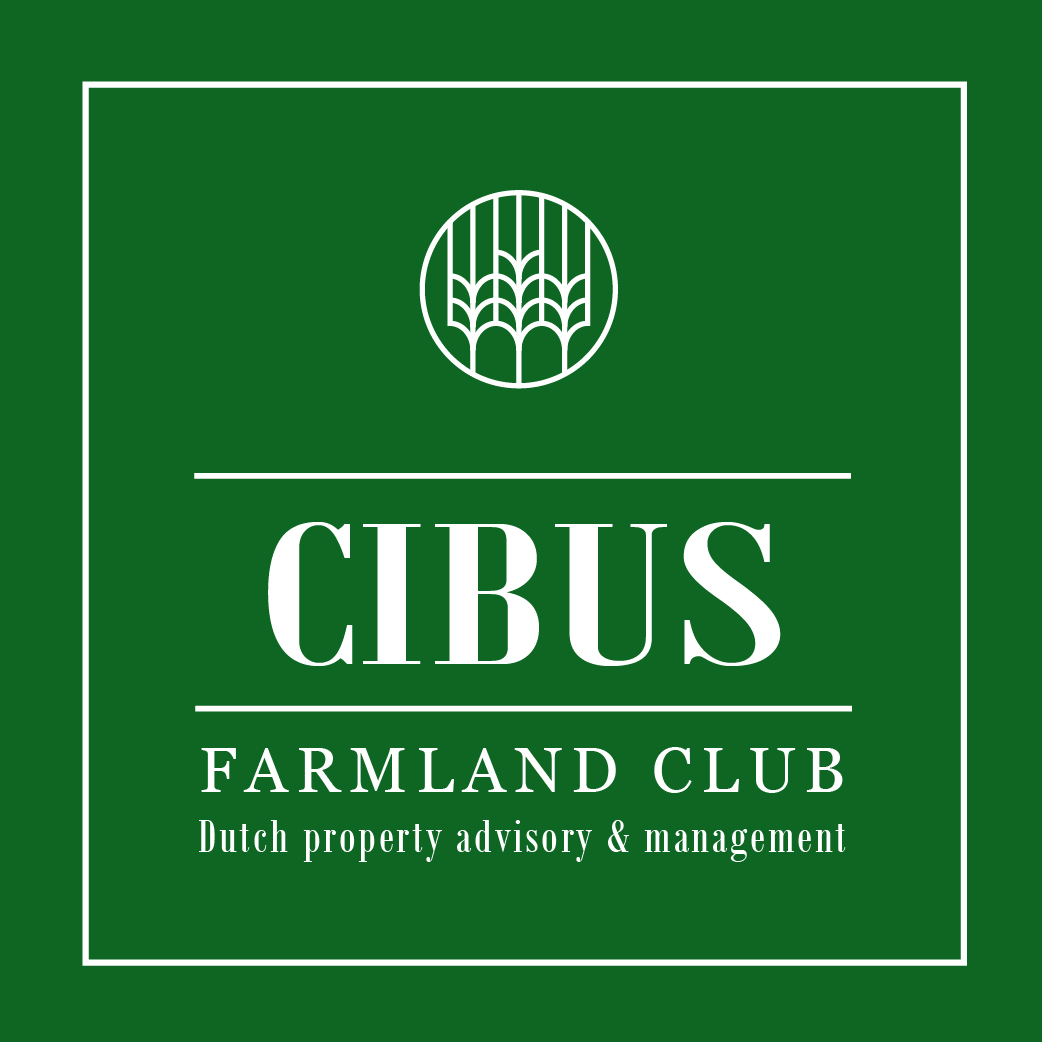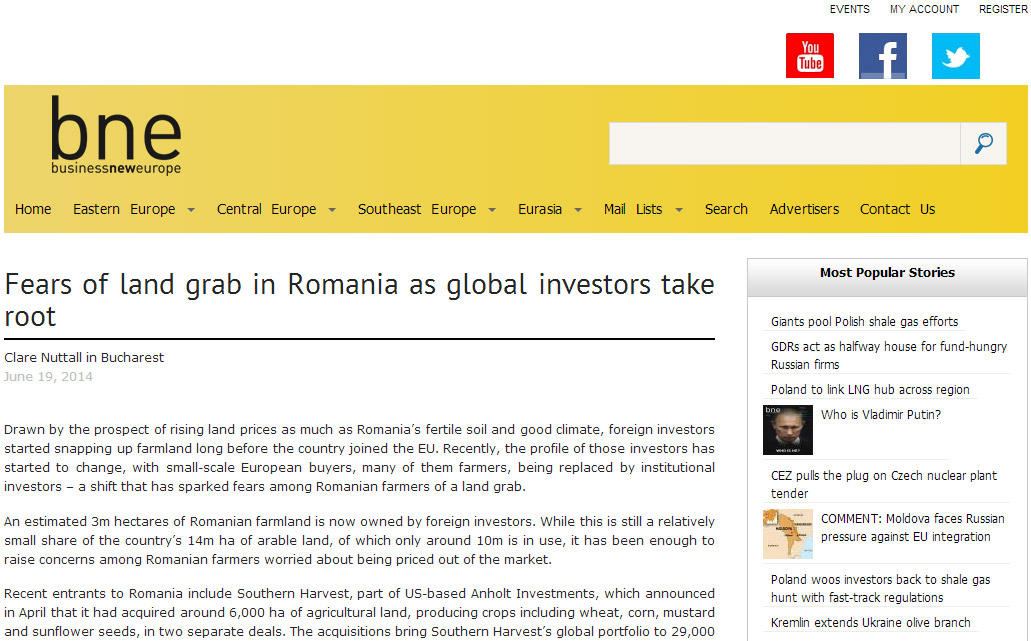bne – Businessneweurope
bne – Businessneweurope – Clare Nuttall
June 19, 2014
Fears of land grab in Romania as global investors take root
Drawn by the prospect of rising land prices as much as Romania’s fertile soil and good climate, foreign investors started snapping up farmland long before the country joined the EU. Recently, the profile of those investors has started to change, with small-scale European buyers, many of them farmers, being replaced by institutional investors a shift that has sparked fears among Romanian farmers of a land grab.
An estimated 3m hectares of Romanian farmland is now owned by foreign investors. While this is still a relatively small share of the country’s 14m ha of arable land, of which only around 10m is in use, it has been enough to raise concerns among Romanian farmers worried about being priced out of the market.
Recent entrants to Romania include Southern Harvest, part of US-based Anholt Investments, which announced in April that it had acquired around 6,000 ha of agricultural land, producing crops including wheat, corn, mustard and sunflower seeds, in two separate deals. The acquisitions bring Southern Harvest’s global portfolio to 29,000 ha, the majority of that in Paraguay and Uruguay. We find Romania to be an exciting jurisdiction, both in terms of the quality of the land and the nature of the commercial opportunity. We look forward to continuing our growth in Romania, as well as in South America, said Anholt partner Rudolph Krediet in a statement.
Anholt is an example of the major institutional investors that now have Romania in their sights; other entrants include the US-based Black Sea Agriculture and Dutch-held Rabo Farm, a division of Rabobank. Investors from both the Middle East and North America have shown an interest in Romania, as part of strategies to diversify their agricultural portfolios. Those that include the European theatre in their portfolios, alongside America and Australia, are typically looking to the [Central and Eastern European] region,says Adam Oliver of agricultural consultancy Brown & Co, which is active in several CEE countries. Most view Romania and Poland as being the most important markets. Further east outside the EU, risk levels quadruple or more.
Top topsoil
The growing popularity of Romania among international investors has resulted in prices more than doubling between 2007 the year Romania entered the EU and 2012, a DTZ Echinox survey says. However, at 2,000-6,000 per ha, land prices are still well below those in Western Europe or even earlier EU entrants such as Poland, and a steady increase is therefore expected.
Romania also benefits from the ability to produce commodity crops. Its several climatic zones allow it to produce a variety of crops, as does the famously fertile chernozem black topsoil on around 60% of its territory. As a result, Agriculture is an important sector in the Romanian economy, contributing between 7% – 10% of GDP, depending on the year and climatic conditions. Given the resources used, however, this is well below its potential contribution, the DTZ Echinox report says.
This is partly due to the high degree of fragmentation in Romanian land ownership. Much of the country’s farmland is split into parcels as small as 0.2 ha when land was handed out after the collapse of communism. Investors are now parceling up small segments of land a lengthy but potentially lucrative process.
Peter Beerents of Cibus Farmland Club, a group of Dutch agricultural companies active in Romania, considers the country is still at the beginning of a big reconstruction requiring both capital and technical know-how, much of which will be provided by foreign investors. We believe the land consolidation of the majority of the numerous small land plots will be completed within some five years from now… thus leading to a better economy of scale and improved crop yields, Beerents tells bne.
With little investment over the last several decades, Romania needs new grain storage and handling systems, irrigation systems and land drainage – a shortfall some foreign investors are now addressing.
Cibus’ aim is to set up well-performing farms in Romania to contribute to agricultural redevelopment. “In order to maximize returns we push them up in three ways; when it comes to land appreciation we consolidate fragmented land plots and add them to the existing farms we initially invested in,” according to Beerents. “These small land plots increase in value as soon as they have been added to the large blocks of our farm in operation. Also we invest some 15% of the total investment in improvement of soil quality and storage. And we get heavily involved in the management and farming operations in order to get a substantial increase in crop yields, thus also leading to higher land value.
However, while risks have fallen since Romania’s entry to the EU, there is no lack of cautionary tales of fraudsters preying in particular off small-scale investors in the real estate sector. Related risks for land purchases include confusion over land titles and competing claims to land parcels from creditors or former owners.
The opening of the Romanian market to foreign buyers from January 1 this year foreign individuals have been able to directly purchase farmland has also added to political risks by sparking fears of a land grab by foreigners. This is a common theme around the world, as both governments and private investors seek to secure productive farmland.
Even Romania’s president, Traian Basescu, weighed into the debate in May 2013, saying that mass land purchases by foreigners were putting the domestic agricultural sector at risk, and advising land owners not to sell. If we like to believe that we don’t sell our country, then I would like to see Romanians not selling their land. This is the first condition to prevent the land being sold, Basescu told the annual meeting of the Romanian Agricultural Producers League, according to Business Review Romania.
The further opening of the market to foreign investors has made the question of land ownership a growing concern across several continents a hot political issue in Romania. During a year of first European and later presidential elections, politicians have sought to drum up support by proposing new limits on foreign land purchases.
However, Olover points out that Romania remains at the more open end of the spectrum in terms of attitudes to foreign land ownership. Restricting purchases by foreign buyers would in any case require a renegotiation of Romania’s EU accession treaty, meaning that the current political grandstanding is largely meaningless.




